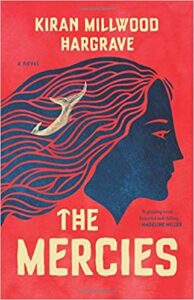The Mercies by Kiran Millwood Hargrave ( Bookshop.org | Amazon.com )
Little, Brown, and Company, 2020
ISBN-13 : 978-0316529259
Available: Hardcover, CD, Audible audiobook, Kindle edition
Sometimes there is a very fine line between historical fiction and horror, and that is the case with Kiran Millwood Hargrave’s The Mercies, a story more chilling than the remote fishing village where it takes place. In 1617, a freak storm at sea killed nearly every man in the village, leaving the women, mostly widows, to take on many of the men’s previous roles, such as fishing, to prevent their starvation and ensure their survival during a long, cold season where the ground was so frozen they couldn’t even dig graves for their husbands. When a commissioner chosen for his skill as a witch hunter arrived, he was assigned to root out the indigenous people, the Sami, who the Christian governor, or lensmann, believed were sorcerers. However, his attempts to govern the women in the village were not entirely successful, and the women who refused to give up their independence were accused and convicted of causing the storm that killed their husbands through witchcraft, then burned.
Past the initial horrific event of the storm, this is a compelling story of women trying to stay alive and survive their grief, most working together even when there are divisions due to personality and beliefs. Those divisions become a chasm too far to cross when a minister, and then the commissioner, arrive to re-establish cultural and religious norms.
Maren, a capable young woman navigating the increasing conflict between her mother and her Sami sister-in-law, and Ursa, the commissioner’s timid, young wife, are the point of view characters, and their awkward relationship is important to both the plot and character development. Ursa is in the difficult position of wanting to belong and help the women who have been helping her, especially Maren, while her husband is tearing the community apart, Maren and Ursa have developed affection for each other, despite Ursa’s complicity in her husband’s horrifying persecution and execution of .Maren’s friend Kirsten and Maren herself. The hysterical accusation and brutal descriptions of torture and execution, as brief as they are, is unbelievably difficult to read as we see and feel it through Ursa’s and Maren’s individual experiences. The description of the village women encouraging a woman about to burn to breathe in the smoke so she’ll suffocate to death before she burns is heartbreaking.
According to Hargrave, historically. fifty-two women were convicted and burned to death in these witch trials. Today women may not be facing accusations of illegally using witchcraft to maliciously attack the men in control, but the sense of dread I felt in reading The Mercies suggests that there is an agenda out there premised on controlling women’s actions, thoughts, and feelings, hasn’t gone away.
Contains: sexual assault, torture, violence, domestic abuse, murder, miscarriage, sexual situations, references to genocide, graphic descriptions of public execution.







Follow Us!